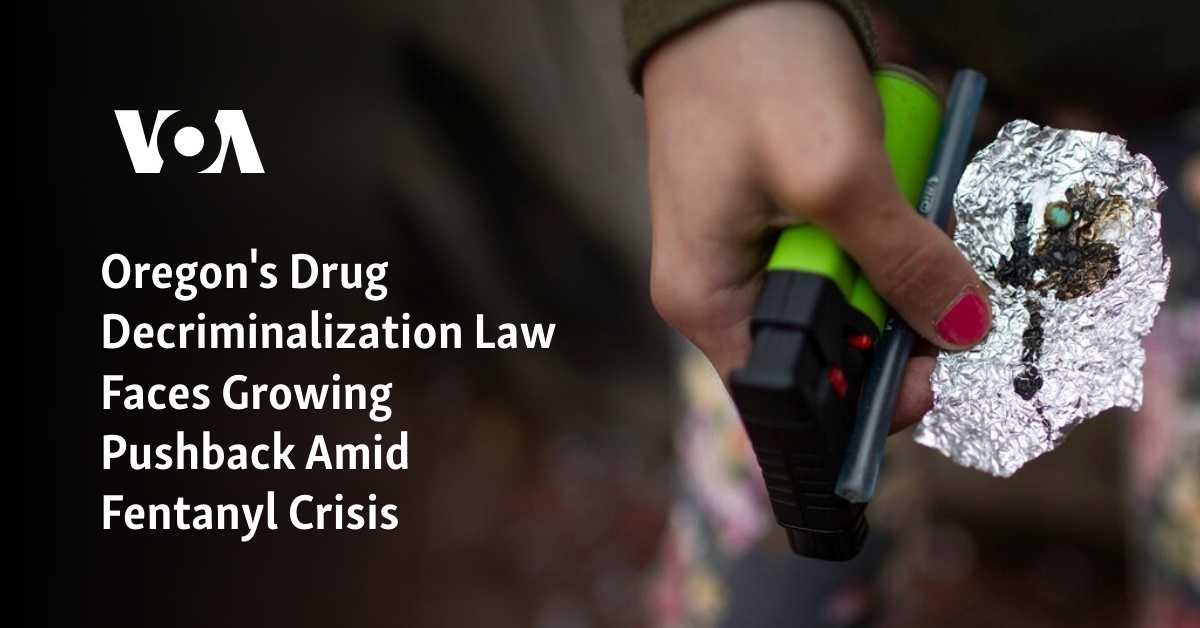This is interesting.
Firstly, I love that states inherently have the power to set their own laws. This allowed Oregon to be a great large scale experiment for drug policy.
I saw some interesting quotes:
But estimates from the U.S. Centers for Disease Control and Prevention show, among the states reporting data, Oregon had the highest increase in synthetic opioid overdose fatalities when comparing 2019 and the 12-month period ending June 30, a 13-fold surge from 84 deaths to more than 1,100.
Despite public perception, the law has made some progress by directing $265 million dollars of cannabis tax revenue toward standing up the state’s new addiction treatment infrastructure.
I guess since only cannabis is sold, it’s the only taxable substance in the mix.
Some lawmakers have suggested focusing on criminalizing public drug use rather than possession. Alex Kreit, assistant professor of law at Northern Kentucky University and director of its Center on Addiction Law and Policy, said such an approach could help curb visible drug use on city streets but wouldn’t address what’s largely seen as the root cause: homelessness.
Homelessness leads to drug use? Or drug use leads to homelessness? Couldn’t it be either?
In the first year after the law took effect in February 2021, only 1% of people who received citations for possession sought help via the hotline, state auditors found.
Critics of the law say this doesn’t create an incentive to seek treatment.
Thoughts:
-
Maybe just start with cannabis and see how that goes? Or do we really need to progress collectively to heroine, meth, cocaine, MDMA?
-
Is the major public health crisis the use of more illicit drugs, or overdoses? Is possible that recreational use of cocaine/MDMA/others wouldn’t be as big of a crisis as meth and fentanyl?
-
Should heroine be legal for use?
-
Should MDMA be legal for use?
-
Should cocaine be legal for use?
( I am not advocating for or against use of these substances with this post. Posted for discussion/interest. Questions are posed for discussion. )
It is very difficult to get people to quit opioids long term when they’re in real physical pain and are stuck with a for-profit medical system that they can’t afford. Getting them addiction treatment will not get rid of the pain. Eventually, they’ll go back to using. What choice do they have?
I am a chronic pain sufferer whose nerve disorder is mostly controlled through medication so I absolutely understand how horrible it is to feel pain every day and I know what it feels like to have something that makes it all go away. In my case, I’m taking neurological drugs, not opioids, but if opioids had worked (and I did try them) and I was in financial dire straits, I might be in the same place as they are.
deleted by creator
Unless by ‘social conditions,’ you mean universal healthcare, I think you’re missing my point.
Hopefully Indiana will allows cannabis cultivation sometime soon. They and KY could just switch from tobacco and make a killing with hemp/ marijuana.
I sure hope so. I’m just glad I’m on the Illinois state line. Wish I was closer to Michigan.
deleted by creator
Fair enough.
deleted by creator
Haha, thank you. I have like Lemmy face blindness so I rarely know who anyone is, but I’m sure you are also worthy of love.
The nice thing about (most) people on Lemmy is that we can disagree- or even just think we disagree when we don’t- and still get along afterward.
deleted by creator
That’s a real concern for sure.
I’ve got c5/6 stuff, already doing cortisone, worried about the future and pain management.
Loads of people trying to balance PM without becoming addicts. Now that we’ve finally seen the systemic pharmaceutical industry issues.
The big takeaway from all this is that if you do programs like this you have to fully fund the treatment and pathway to sobriety. Economically you’ve got to give these people a chance to rebound back on their feet. I suspect the support funding was less than needed and that’s why this is collapsing
So - I’ve wondered, as I’m sure others have as I probably read this somewhere and it stuck with me - why don’t we just legalize all drugs.
That’s it - all of its legal. We don’t care anymore. No more stigma, do what you want.
Now - we take aaaallllllllllll the money we use to fight a war on drugs we never win, allllllll the money we use to arrest people and fund our police state, alllll the money we use to keep people in prison…
And we put it into rehabilitation and mental health and education and housing the unhoused.
I mean is that so insane?
deleted by creator
You can set up a justice system that is designed to reduce harm and to make the victims whole.
But doing so seems to be pretty incompatible with seeing up a penal system designed to harshly punish offenders. Because harsh punishments do not seem to be effective at preventing bad actions that create victims.
Especially in the US, we’ve made the choice to have a penal system instead of a justice system. And so our system does not exact justice, it just passes down punishments.
I’m for drug decriminalization and all the various kinds of harm mitigation strategies to make drugs safer to use. But I also will admit without hesitation that modern synthetic opioids and amphetamines are black holes that consume a person’s entire being. If we want widespread drug decriminalization we need to do a lot of other side work to stop people from being spaghettified. We need housing and healthcare and an expectation of a baseline dignified life for everyone because if your life is going to be without dignity either way you may as well be injecting heroin while doing it.
That’s basically what Portugal did. Sounds like it’s working pretty well for them.
I think this what I saw before yeah - thank you! I’ll read this again.
The fully funded path out is what Oregonians were promised, but our elected officials entirely dropped the ball on making it happen.
Yeah OP mentions the $265 million in funding but that hasn’t been used to fund anything. I haven’t seen a single new treatment center open up.
Also be aware that anywhere with easy travel the place with the least restrictive laws will most likely attract the people who want to do the thing that illegal everywhere else. So it will require more support than just the existing population.
But really the expectation that drug users who have historically been treated like shit by the government will use a new government hotline is ridiculous.
Your take away was people couldn’t get treatment?
It said there was little treatment participation.
Perhaps this could be related to the logistics of getting there perhaps.
Did homelessness increase as well as rent and cost of living during the time frames they are using?
Covid probably doesn’t help the veracity of the results comparing to 2019 either.
That’s a very good question.
I’m on a phone, so this is the low effort result I’m got from copilot ( I know…I know…):
According to the data from my internal tools, the cost of living in Portland, Oregon is higher than the national average in most categories. Here are some of the key findings:
- The average rent for an apartment in Portland is $1,728⁵, which is 35% higher than the national median of $1,280[10]. The average rent varies depending on the size, location, and quality of the apartment. The price range for all bedrooms and all property types is $485 to $15,000⁵.
- The average annual consumer expenditure of consumer units in Portland is $61,334[10], which is slightly lower than the national average of $61,483¹¹. However, the percentage of spending on housing and housing-related costs is higher in Portland (34.9%) than in the U.S. (32.8%)[10].
- The cost of living index in Portland is 127.7, which means the total cost of housing, food, childcare, transportation, healthcare, taxes, and other necessities is 27.7% higher than the U.S. average of 100⁷. The cost of living index varies depending on the source and methodology used. For example, another source reports the cost of living index in Portland as 136.3¹².
- The cost of living in Portland is influenced by several factors, such as the high demand for housing, the relatively high income taxes, the environmental regulations, and the quality of life⁹. Portland is also known for its cultural diversity, progressive values, and natural beauty⁹. Some of the benefits of living in Portland include the public transportation system, the bike-friendly infrastructure, the access to outdoor recreation, and the vibrant arts and food scene⁹.
Source: Conversation with Bing, 2/18/2024 (1) Average Rent in Portland & Rent Prices by Neighborhood - RentCafe. https://www.rentcafe.com/average-rent-market-trends/us/or/portland/. (2) Examining The Cost Of Living By State In 2024 - Forbes. https://www.forbes.com/advisor/mortgages/cost-of-living-by-state/. (3) U.S. cost of living - statistics & facts | Statista. https://www.statista.com/topics/768/cost-of-living/. (4) Cost of Living in Portland, OR 2024 | RentCafe. https://www.rentcafe.com/cost-of-living-calculator/us/or/portland/. (5) Cost of Living in the United States: 2202 cities compared - Livingcost.org. https://livingcost.org/cost/united-states. (6) The Cost of Living in Portland in 2022 | Rent. Blog. https://www.rent.com/blog/cost-of-living-in-portland/. (7) Portland, OR Cost of Living - Sperling’s BestPlaces. https://www.bestplaces.net/cost_of_living/city/oregon/portland. (8) Cost of Living in Portland, Oregon. Feb 2024. Prices in Portland - Numbeo. https://www.numbeo.com/cost-of-living/in/Portland. (9) Cost of Living in Portland, OR: rent, food, transport [2023]. https://livingcost.org/cost/united-states/or/portland. (10) Cost of Living in Portland, Oregon. Updated Prices Feb 2024. - Expatistan. https://www.expatistan.com/cost-of-living/portland. (11) Average Rental Price in Portland, OR & Market Trends - Zillow. https://www.zillow.com/rental-manager/market-trends/portland-or/. (12) Average Rent in Portland, OR - 2024 Rent Prices by Neighborhood. https://www.apartments.com/rent-market-trends/portland-or/. (13) Cost of Living Index by State 2024 - World Population Review. https://worldpopulationreview.com/state-rankings/cost-of-living-index-by-state. (14) Cost of Living in United States - Numbeo. https://www.numbeo.com/cost-of-living/country_result.jsp?country=United+States.
At face value, based on summarized data, looks like it’s expensive there.
Is that sole causation for increase homelessness? Or just a contributing factor an addition to drug use? 🤔
deleted by creator
Decriminalization does not mean it should be readily available. Decriminalization will never work if we don’t follow it up with meaningful investment in rehabilitation therapy for folks that abuse it.
Some substances should still be controlled as they are too dangerous (ie. Fentanil)
A lot of good local articles on the topic, including radio pieces following cops in bad parts of town. A major failing of the program is that it was difficult to seek help even if you wanted to, with sometimes 1 hr phone wait times to set a time to wait an hour to talk to someone. The intent - to funnel users into treatment - wasn’t met.
A better method (in my opinion) would be a “treatment or jail” system, which would put people in a 6-week contained treatment system pre built with capacity to handle the load… Oregon may be liberal, but that would never fly, and the republicans would rather walk out and shut down the state house than allow it.
But we tried. Back ti letting everything fall apart until the state collapses.
I don’t understand why a treatment or jail program wouldn’t be desirable.
Cost? Wasn’t it potentially offset by cannabis taxes?
Capacity? Didn’t addicts already get locked up? Or maybe now there’s no capacity because the low level addicts have not been locked up and adjustments were made?







